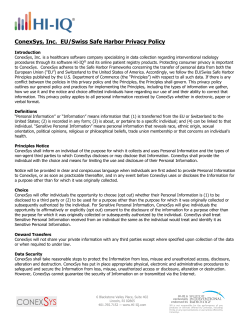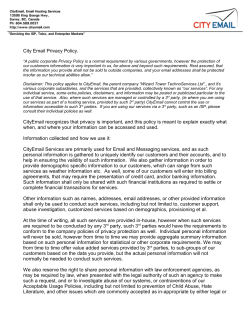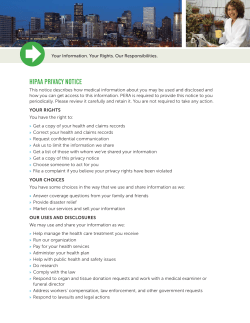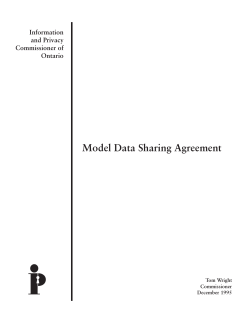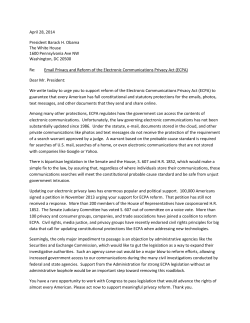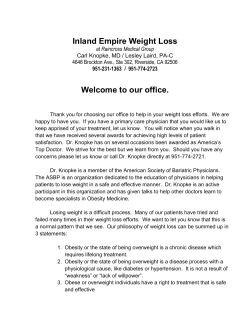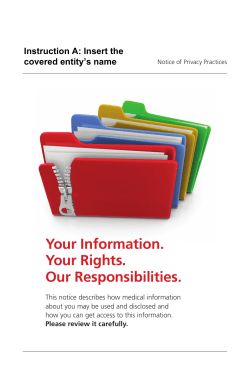
How to Get
cies have a large backlog of requests and routinely ask for longer deadline extensions. It usually makes sense to put up with a reasonable delay and continue your correspondence with the agency for a short time before taking further action. Make it clear, though, that you are not giving up your right to appeal. What if Your Request is Denied ? If some or all of your request is denied, you can appeal. You should send another letter and state that your are appealing the denial, that you contest the agency’s actions, and that you expect a ruling on your appeal within two business days (20 days if under FOIA). Attach copies of your original request letter and the agency’s response. You may want to argue in your appeal letter that the claimed exemptions are not appropriate or that the agency has not made enough of an effort to separate and release nonexempt parts of documents. The statues require the agency to balance the privacy interests of individuals against the public’s interest in disclosure; therefore, you may want to explain why disclosure will benefit the public. If journalistic, scholarly, or public interest is involved, point this out. The agency is required to review your request again. If your appeal is denied or the agency does not respond within the deadline, you can go to court. You should consult a lawyer first. In court, the burden is on the agency to justify its actions. If you win in court, the agency can be required to pay your attorney fees and costs. You do not need to win completely; you only have to receive “some of the benefit” you sought. Under the state PDA, a penalty for delay in providing records may be awarded in an amount from $5 to $100 per day. Be persistent before resorting to a lawsuit. A followup letter or call will often shake loose the additional documents you want. Sometimes another request to a different office of the same agency will yield more records. Correcting Your File If a federal agency’s file on you is incorrect or contains information you believe is irrelevant, you can request that it be changed. The Privacy Act requires that personal files be accurate, relevant, timely and complete. If the agency refuses your request, it can be required to include your comments in the file whenever it discloses your file to others. (There is no similar provision under state law except for the Washington Criminal Records Privacy Act, RCW 10.97, which allows correction of criminal record information.) Rev. 1/05 Your Right to Inspect and Copy Government Records is Established by State and Federal Law osur e Act The Washington State Public Discl Disclosur osure (PDA) (RCW 42.17) provides for citizen access to state and local government records in Washington State, including local records about yourself. The federal Freedom of Information Act How to Get Government Records (FOIA) (5 USC 552) provides access to the records of federal government agencies. The federal Privacy Act (5 USC 552a) also governs personal files maintained by federal agencies and some federal contractors, and allows you to expunge or correct those files. These laws specify what records must be disclosed and provide a right to administrative appeal and court review if records are withheld. To request records you need only write a letter or make your request in person if the records are at a state or local agency. American Civil Liberties Union of Washington 705 Second Ave., Suite 300, Seattle, WA 98104-1799 www.aclu-wa.org 705 Second Ave., Suite 300, Seattle, WA 98104-1799 www.aclu-wa.org A ccess to government records is an important right of citizenship. Government agencies have often worked in secrecy, but today you have the right to inspect and copy a wide variety of government records. This applies to many types of documents, as well as any files maintained on you, unless they are specifically exempted from disclosure by law. By using the state and federal disclosure laws, you help make open government a reality. What Records Can You Get? If you want records of a local or state governmental agency, you can request them using that state’s Public Disclosure Act (PDA). If a federal agency has the records you want, two federal laws apply: the Freedom of Information Act (FOIA) and the Privacy Act. These laws allow you to inspect and obtain copies of agency policies, reports, correspondence and minutes. Even certain investigative and intelligence files must be disclosed, with some deletions to protect the privacy of others and certain limited government interests. For example, documents can be withheld if they are not final products. However, information cannot be withheld just because it might embarrass public officials or show improper actions. The Privacy Act lets you inspect and correct files maintained on you by federal agencies and control some uses of those records. If anything in these records has been used to deny you a benefit, right, or privilege (such as employment or a federal grant), you must be allowed to see it unless it reveals the identity of a confidential source. Since some materials that are exempt under the Privacy Act may be available under the FOIA, you should refer to both laws when making your request. Both state and federal law require that if part of a document is exempt, the non-exempt parts must still be disclosed. Neither state nor federal law applies to private organizations which maintain records, although, in a few cases, there are separate laws providing access, such as fair credit reporting. How Do You Make a Request? First, decide what documents you want and what agencies might have them. For speedier results, get a complete address of the agency person who handles public disclosure requests. Simply write a request letter to each agency; some agencies have forms you may use. The first sentence of your request letter should identify the statute you are using: “This is a request under the [insert name of state or federal statues].” Describe the documents you want. If you do not know the names of the documents, you should ask for “all records relating to” a particular subject. Be as specific as possible. Refer to the particular incident and names of the people involved. Volunteer to help clarify your request. Some agencies have indexes of the records they maintain; it may be helpful to examine such indexes. Where indexes exist, they are subject to public disclosure. There is no requirement to explain why you want the documents, and it is probably better not to state the reason unless it is relevant to describing the documents. Add a paragraph stating that if the agency believes any documents or portions of documents are exempt from disclosure, it should send what is not exempt and describe what information is not being released and why. Print and sign your name. Get your signature notarized if you are requesting your personal files from a federal agency. Notary services are often provided by banks, realty, law, and accounting firms. Include your phone number so the agency can call to clarify your request or discuss it with you. (Take notes on all such telephone calls.) Date the letter and keep a copy for yourself. Write on the envelope “Public Documents Request.” How Much Will it Cost? Under state law, you can inspect records for no fee. The PDA also prohibits charges for locating public documents and making them available for copying. Unless it creates an undue burden, state and local agencies are required to produce and make available a statement of the actual per page costs and other costs that they charge for providing copies to the public. If calculating a per page cost is unduly burdensome, the agency cannot charge more than 15 cents per page. Under the FOIA, federal agencies can charge a “search fee.” Usually there is no fee for locating a personal file indexed under your own name. A fee is more likely if the agency must search several files or weed out documents you did not request. Each federal agency maintains a fee schedules (usually 10 or 20 cents per page). Ask in your request letter that the agency give you prior notice if the costs will be more than a certain amount ($25, for example). If the fees are more than you can afford, ask for a reduction in price. Congress did not intend that access to federal records be obstructed because of cost. The FOIA also provides that search and document review fees may not be charged to as scholar, educator, or news media requester, and it lets an agency waive or reduce fees if releasing the information will benefit the public. If you think your request qualifies, point this out in your letter by naming news articles or other items which show the public’s interest in the subject. If your request is on behalf of a scholar, reporter, or non-profit group, say so. How Long Will it Take to Get Your Records? Under the FOIA, the agency must send you your documents within 10 business days after receiving your request. For burdensome requests, the agency can ask for an extension of up to another 10 business days. Under the Privacy Act, the agency should acknowledge your request within 10 business days after receipt. The records themselves should be sent to you within 30 business days. If this is not possible for “good cause,” the agency should tell you why and give you the date it expects to be able to comply. Under the state PDA, the agency must respond within five business days. The time may be extended if additional work is needed to respond, but the request must at least be acknowledged within five days. If an agency misses its deadline, you are allowed to treat that as a refusal of your request and to appeals (see next section). However, some agen-
© Copyright 2025




